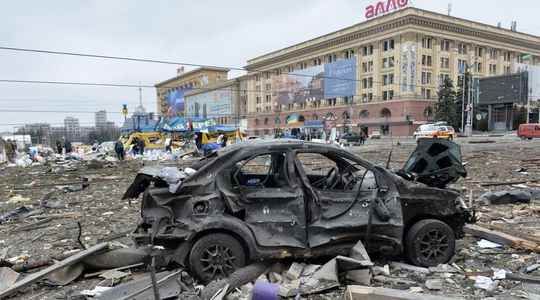“There is no longer an area in Kharkiv where an artillery shell has not hit yet.” The sentence, dropped on Wednesday March 2 by an adviser to the Ukrainian Interior Minister, says a lot about the efforts made by the Russian army to seize the city, the second largest in Ukraine with 1.4 million inhabitants. Since the start of the Russian offensive launched on February 24, the metropolis in the northeast of the country, located about forty kilometers from the Russian border, has been at the heart of the fighting.
His capture would be of major interest to Moscow. “Important roads leave from Kharkiv towards Kiev and their control would allow logistical support for the Russian forces which surround the Ukrainian capital”, points out General Dominique Trinquand, military expert and former head of the French mission to the UN. The Ukrainian capital, also fiercely disputed, is 500 kilometers further west. “Furthermore,” continued the general, “it would allow Russian troops to fall back to the south of the country and isolate the Ukrainian forces who are fighting in the Donbass, further east.”
A sign of its strategic importance, the Ukrainian armed forces reported, overnight from Tuesday to Wednesday, the dispatch of Russian airborne troops to the city and fighting near a local hospital. Earlier Tuesday, the city center had already been the target of intense bombardments which left at least 21 dead. “It’s a war crime. It’s state terrorism”, denounced the Ukrainian president, Volodymyr Zelensky, in the process. New strikes hit buildings of the security forces and police, as well as the university and the town hall, on Wednesday, killing at least four additional victims.
Ukrainian resistance
On the seventh day of the conflict, the capture of the city appeared to be a strong objective for Moscow. “The invasion launched by Russia began a week ago and does not give the impression of really advancing, observes Jean-Pierre Maulny, deputy director of the Institute of international and strategic relations, and specialist in defense issues. But war is also about communication, so it becomes important for Putin to be able to show success.”
Beyond the symbol, the capture of Kharkiv would also be the way for the Russian army to have a powerful anchor point and the many facilities of this city which was the economic and industrial capital of Ukraine throughout the Soviet period. “The capture of a large city always offers interesting infrastructures, in particular command centers”, confirms Jean-Pierre Maulny. The opportunity, also, to take control of Kharkiv International Airport, renovated in 2012, one of the largest in the country.
It remains to be seen how long Kharkiv can still hold out against the hardening of the Russian offensive. After four days of fighting, the regional governor, Oleh Sinegubov, on Sunday welcomed the “complete cleaning” of the city by Ukrainian forces. “Seizure of an urban area is always something extremely complicated and costly in human lives for the attacker, underlines General Trinquand. Everything will depend on the Ukrainian resistance inside the city: it can take several days several weeks.”
